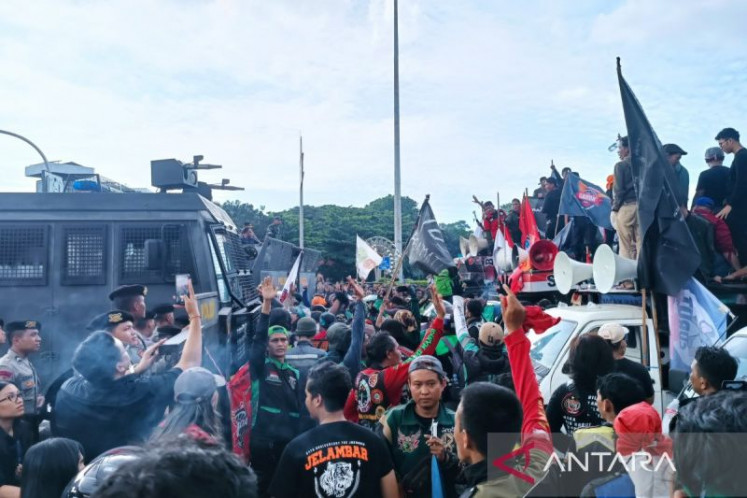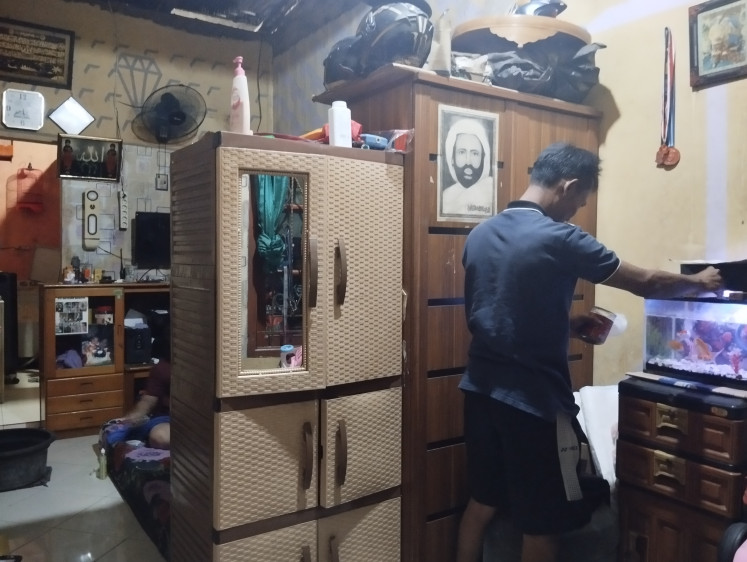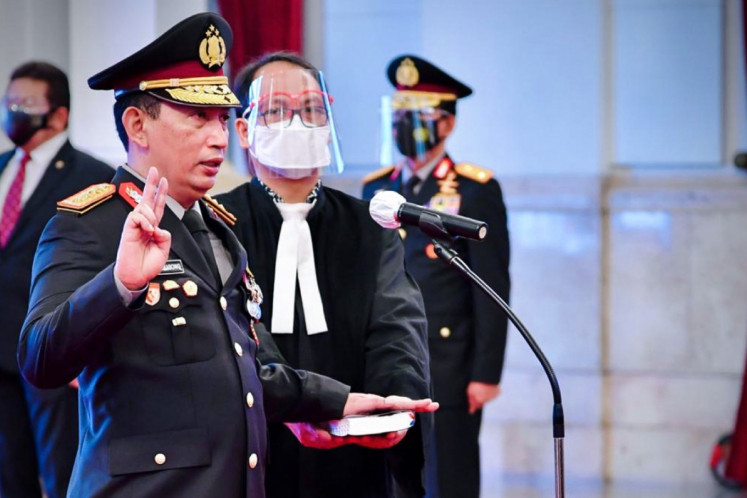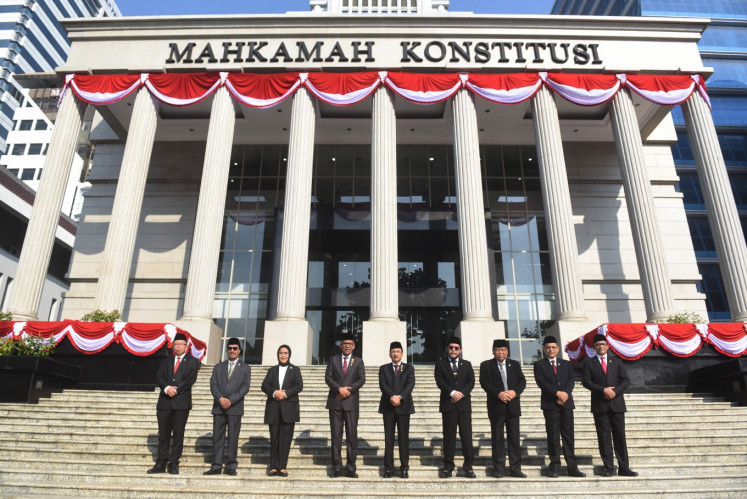Popular Reads
Top Results
Can't find what you're looking for?
View all search resultsPopular Reads
Top Results
Can't find what you're looking for?
View all search resultsWhen songs speak louder than slogans
Change text size
Gift Premium Articles
to Anyone
 One classic holiday song is proving too controversial for some stations in the wake of the #MeToo movement. (Shutterstock/Africa Studio)
One classic holiday song is proving too controversial for some stations in the wake of the #MeToo movement. (Shutterstock/Africa Studio)
W
hat do you do when you get angry? Scream, shout, call people names, make threats? Or do you start throwing things, or — horrors! — punch a glass door? Oh boy, negative and destructive — get out of the way!
Good thing I’m able to channel my anger through my writing. Lucky me!
You know who else is lucky in this respect? Singers and songwriters. As the late Amy Winehouse said: “Every bad situation is a blues song waiting to happen.” Or songs of any music genre for that matter: ballads, rock, jazz, hip-hop, pop and would you believe, even country music — imagine that!
You know how things are easier to memorize when set to a tune? Well, protest songs are also more palatable because of their music medium. Protest songs are usually part of a movement expressing a desire for social change.
These songs are not just a means of venting, but are a form of commentary — a message, an opinion, an observation, or analysis — of some social ill or injustice; they could also be a defense of a cause, or a call to work for a common good.
So I was really pleased to attend an event at the Erasmus Huis on Dec. 4 entitled “Records and Rebellions”, the result of a collaboration between the Indonesian Heritage Society and the Communication Department of Binus University International, featuring three singer-songwriters.
The first was Lala Karmela, 32, who opened with her signature song, “Morning Star” — her personal “I can do it!” manifesto. Yup, she’s a supporter of women’s rights and gender equality and urges victims of sexual harassment to speak out. She’s also performed with music legends such as Iwan Fals, and the rock band Slank, both of whom have gained cult status for their social criticism lyrics.
Lala had just returned from Palu, Central Sulawesi, where she had gone at the invitation of the United Nations Population Fund on AIDS Day to raise not just awareness of HIV/AIDS but also reproduction, health, hygiene and sexual harassment.
The second singer was Ardhito Pramono, 23, who has a surprisingly mature voice, soft but full-bodied — like good wine! His struggle started at home, pursuing a music career against his father’s wishes. He also writes songs that address social disconnect, often brought upon by social media, the very thing that put him on the radar in the first place.
The pièce de résistance of the evening had to be Kartika Jahja, aka Tika, 38, one of the handful of Indonesian women songwriters who write and sing social protest songs. Tika recounted that despite being brought up during the New Order era, she was shielded from the brutality of oppression and human rights violations of the regime. Her exposure to music made her aware of these realities.
She became more interested in subculture scenes, going to her first underground music gig at age 14, in 1994, “where bands brazenly stuck their middle fingers up to a photo of the president”. Oops, in the New Order era you could get killed for that!
She started listening to the now defunct indie bands like Puppen (1992 to 2002) and Homicide (1994 to 2007) whose performances were punctuated with fists in the air, singing songs about “corruption, police brutality, calling out conglomerates who rob people of their lands and water”.
Like many of our protest singers, she was influenced by Iwan Fals, but her personal inspiration was America’s Nina Simone (1933 to 2003), known for using her music as a forum to speak out.
Nina believed that “women play a major part in opening the doors for better understanding around the world” and Tika is doing just that.
“Music cracked open the shell that sheltered this little privileged girl and exposed her to the world as it is and she can no longer unsee it. She knew she could sing. She knew she wanted to be a musician, but more importantly she realized how her voice can be powerful,” Tika told the audience.
Indeed powerful it is, her voice, as well as her lyrics. Together with her band Tika and the Dissidents, she released her first album The Headless Songstressto wide acclaim. The band’s surprising eclectic and delightful repertoire and genres — blues, jazz, doo-wop and even tango and waltz — also addressed gender and sexuality, lesbian, gay, bisexual and transgender issues, labor and human rights.
In 2013 she bravely came out in the national media as a child rape survivor and that same year wrote “Tubuhku, Otoritasku” (My Body is my Authority).
The song is about Indonesian women reclaiming their bodies from the clutches of patriarchal social constructions — whether they be religious, cultural, social, or just plain old body-shaming. In the same way that Helen Reddy’s song “I am Woman, Hear me Roar” became an enduring anthem in 1972 for the women’s liberation movement, Tika’s “Tubuhku, Otoritasku” became an anthem for feminists throughout Indonesia.
With all her achievements (she’s also a published writer, actress and entrepreneur), it’s no wonder that in 2016 Tika made it onto the BBC’s 100 Women, a list of the world’s 100 most inspiring women. She also caught the attention of Aljazeera, The New York Times, NHK, etc., which gave her an even broader platform, as she says, “to open up a dialogue on deeper layers of women’s issues: consent, body positivity, reproductive health, sex trafficking, even child marriage”.
What I love about Tika’s songs is that she is not a “socialist realist”. Her lyrics are powerfully true, but the melodies are also varied and appealing. One of my favorites is “Unlearn the Fight”. The song is about parents and social groups who raise their children according to their divisive “isms”, which ultimately lead to the tension and conflict that we see so much of in the world. The melody just stuck in my head and it’s been playing there nonstop!
The reason I write is also to raise awareness, inform, but entertain at the same time. Hmmm, I wonder if I should start collaborating with my younger, talented, singer sisters? Set my writing to music. How about it, Tika?
We live in unsettled times, which we read about daily. Why not make these issues more palatable by setting them to music, after all, songs are nicer to listen to than slogans. If these songs can inspire social change, wouldn’t that be better for everyone?
***
The writer is the author of Sex, Power and Nation.









